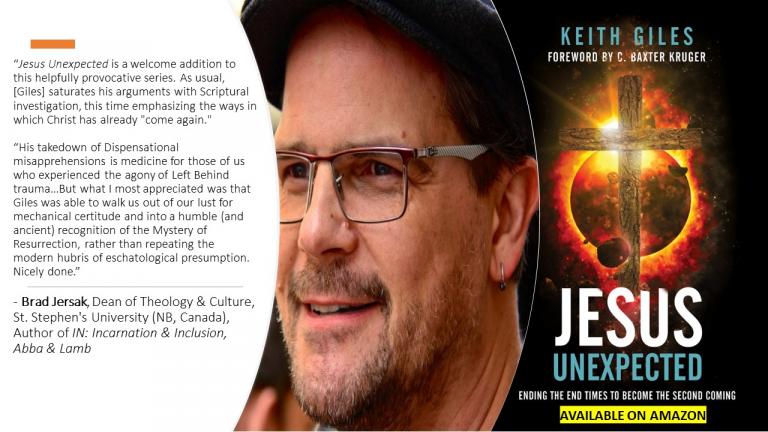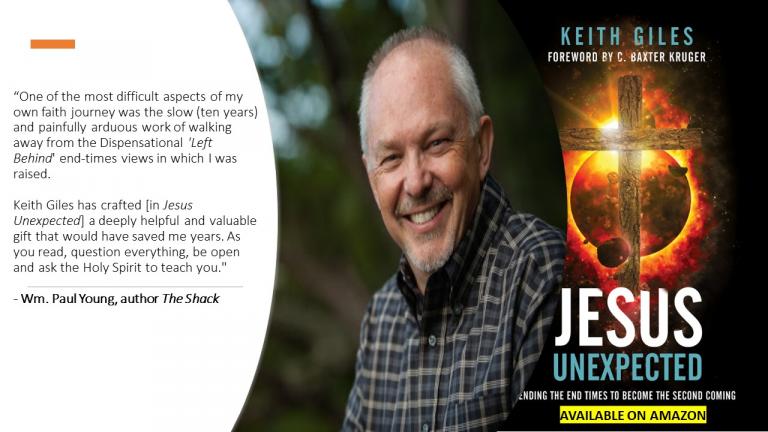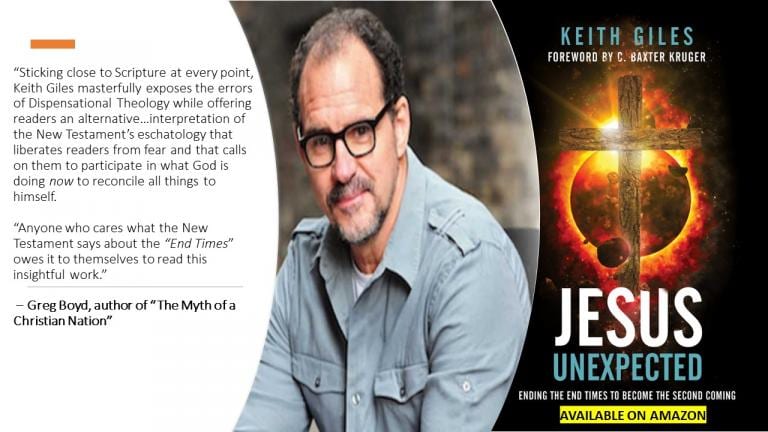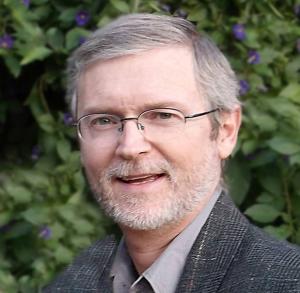Comment and Observation
by R.E. Slater
Deconstructing My Baptist Heritage
In my former "Covenant Theology" of the Old and New Testaments I would teach the bible in the way Keith Giles is teaching it below. But, whether Keith is a Covenant theologian or not, I do not know.
I also once entertained Calvinism as part of my covenant theology where God rules determinatively from the heavens above. Again, whether Keith Giles is a Calvinist or not, I do not know.
However, both of these approaches to the bible was how I had been taught in my (Reformed) Baptist tradition which I had grown up within. Today, I have kept the Covenants in both Testaments but have actively removed Calvinism (theocratic determinism) by replacing it with Arminianism (theocratic creational freewill agency) and have also contemporized Arminianism in the direction of Open and Relational theology.
Further, instead of placing my biblical belief upon the foundations of Greek (Platonic) philosophy, (Catholic) Scholasticism, Enlightened Modernism; or upon analytical Westernized philosophy; I have removed these earlier philosophical foundational bedrocks in favor of Whitehead's process-based philosophy. Hence, here at Relevancy22, I will teach "Open and Relational Process theology which is grounded upon Whitehead's all-encompassing metaphysical process philosophy."
Some will describe process philosophy as a halfway house between Westernized analytical philosophy and (European) Continental philosophy.... However, I think of it as on it's own, and if comparing it with other cultural and religious ways of thinking and behaving, than as a step towards the Middle Eastern and Asian Eastern ways of perspectivizing at the world. In essence, Christianity should be more easily adaptable to non-Westernized nations if it is to be global in outreach. Moreover, nature acts more organically as a whole and less like how we have depicted it in the West over the centuries even though Whitehead was initially attempting to close the gap between Einsteinian and Quantum physics. As a result of his work Whitehead connected Hegel's prior cosmological work from the ancients to today's cultures and I have found in it a compassionate and hopeful teleology for the future.
A Covenantal God of Love
When approaching the bible I like to teach it within the theocratic Covenantal structures of its Testaments using a form of freewill agency where God is our "ruling" Creator/Sustainer and "present" Atoning/Savior but with an open-endedness to all past assumed determinative biblical "prophecy". This would also importantly include a God who is highly relational and always relationally present in our lives and the lives and events of creation about us.
A God who urges us towards partnering with God's Self in bringing the Good News Gospel of God's Love and compassion through Jesus to the world - and to treat the world of creation lovingly at all times... which is quite the opposite which we find most non-democracies. And into all of this I have given to my Baptist heritage a process-relational structure and direction which is evolving over time as we lean into God's forgiving love, care, healing, mercy, and sustaining beauty.
Deconstructing the Bible and Our Beliefs
Now I do not expect Keith Giles to know about process relational theology. Nor, perhaps, to accept any form of lovingly "open and relational" theology. But when reading the article he wrote below I do appreciate his distinctions of biblical phraseology and would encourage those who read the bible to read it with an uncommon distinctiveness to it. By so doing, you will be creating more of an inductive bible study than the usual normative bible study positing popular conservative beliefs.
By this I mean that we learn to rethink the bible in holistic terms of thematic relational structure underlaid by God's holy love... and to define biblical terms more within era-contextualized and culturally-specific iconocology rather than grossly generalized bible interpretations popularized by American culture. Hence, within the bible's literature will be found differing Jewish beliefs over their ancient eras which sensed the Christ-event but laid out it's own cultural assessments within the God-inspired revelation they had presently understood. And when the Christ-event did take place, first-century Jews accordingly divided their beliefs along Messianic or non-Messianic lines. Hence, terms like "God's wrath and judgment" are enhanced or decentered when not informed by the Jesus' Incarnate - and Incarnating - compassinate presence.
How God Made the Heavens and the Earth
Lastly, I have tweaked how I think of God unlike how the ancients thought of God in the bible. Their faith was informed by God's judgment and wrath as well as mercy and grace... but with the evolution of science and modern technology our present understanding of natural events are less mystical and more perfunctory (carrying an attitude of indifference or apathy).
As example, a storm is a storm without any meaning or message from God ethically or morally.
Because of creational freedom, nature's actions carry out events which are in line with it's "nature"... it's events may hold good or bad consequences for humans but in itself, we deem nature to be acting-in-kind to its natural self. It holds no form of "consciousness" per se of revenge or blessing (though process thought does recognize creation to have its own kind of living "consciousness" within its cosmic existence (we describe this as process-based panpsychism, which I have spoken to many times before). Thus, creaturely-and-natural events just "are" without any further implied spiritual meaning from God.
Yet, a wise man or woman would observe nature as John Muir or Aldo Leopold had done in the twentieth century, by recognizing within it's evolving output that nature is reacting to any form of mankind's external inputs. When we pollute a river there will be toxic biotic consequences to our actions. When we create mown lawns we are creating toxic deserts to bugs, birds, and varmints. When we enact war upon one another we will disturb the natural processes of the land upon which a war is being conducted... not to mention the tragic, desperate lives caught between war zones.
Similarly when we do good things in naive ways: (i) we recognize that farming practices feeds others but how we "till the land" can disturb the natural cycles upon the land. (ii) Building cities and roads across wetlands and swamps inadvertently create thermal heat sinks around a rural and urban metropolis to which powerful winds will build and react. (Iii) Placing a dam into canyons and cataracts provide water to people yet also produces additional erosional burden opon the streams located above a dam. Hence, for every naive industrial impact upon the land which mankind levies on the earth there will be a mounting order of ecological reaction akin to our own naivete.
The obvious message from God is that our wisdom is not like God's wisdom... that we need to consider the consequential burdens we place upon land... and it's resultant impacts upon people... when mining, digging, molding, shaping, building, or warring.
Conclusion
Overall, I wish to create a theology where God's love - and loving acts - are the foundation stones upon which we interact with God. In Jesus - and by Jesus' incarnational atoning work - God has shown God's Self to be loving as versus the more ancient biblical idea which beheld God as an angry Semitic (covenantal) despot requiring appeasement at every moment in our lives (altars and sacrifices). But in Jesus, he expanded the more important relational aspects of Covenant living with the God of God's and Lord of Lords that the Covenant-making God is first, last, and always a loving and compassionate, relationally present, God. Amen!
Perhaps these thoughts may help: i) those students of the bible, and, ii) Christians living and sharing their faith in innumerable socio-religious and cultural ways. I know it has helped myself when informing my Baptist faith when re-framing, or bathing, or re-centering, it in God's loving presence. That my Covenanting Father/God is as lovingly benevolent as he is my faithfully sovereign Lord and Savior.
Blessings,
R.E. Slater
May 30, 2024
* * * * * * *

Here’s Why Most Christians Are
Confused About Biblical Prophecy
LAST UPDATED ON: SEPTEMBER 10, 2020 AT 7:29 PM
SEPTEMBER 10, 2020 BY KEITH GILES
Other than the fact that a large majority of Christians have been raised to believe in the End Times Rapture theory created in 1850 by John Nelson Darby, the main reason there’s so much confusion about the End Times and Biblical Prophecy is how we have been trained to understand certain Biblical terminology.
IA
For example, when we read the phrase “the end of the age” we hear “the end of the world” or “the end of time,” but that’s NOT what the phrase is referring to.
“The end of the age” is a reference to the end of the Jewish age which was originally prophesied in the book of Daniel [See Dan. 12:7 & 13] and later confirmed by Jesus in his Olivet Discourse. It’s not about when the world will end or the planet will be burned up, but about when the age of the Jewish people ends and the age of the Gentiles begins. Paul makes reference to this in Romans, also.
The end of the Jewish is simply when the Old Covenant Temple was destroyed, the Old Testament priesthood was ended and the daily animal sacrifice ceased forever. That was what happened in AD 70.
IB
The end of the age is also the beginning of the next age [or the “age to come”] where the New Covenant reality is unfolded and expanded upon the earth. This is the age we are in right now.
II
Another phrase we tend to misunderstand is “coming in the clouds” in reference to Jesus. For example, when Jesus says that people will see him coming in the clouds in Matthew 24, or when he tells the High Priest that soon “…you will see the Son of Man sitting at the right hand of the Mighty One and coming on the clouds of heaven” [Matt. 26:64], he is not talking about the day he literally comes riding in the sky on a horse to initiate the Rapture.
The term “coming in the clouds” is a reference to God’s judgment being poured out on a nation or a city used all throughout the Old Testament scriptures by various prophets. It’s never a literal “coming in the clouds” where God shows up physically in the skies, but always a metaphorical way of saying that the destruction God’s prophets warned the people to avoid is about to be poured out – usually in the form of an invading army which destroys Babylon, or Edom, or Egypt or even Jerusalem.
III
Another example of how the coming of Jesus is seen as a warning of judgment is in Revelation where Jesus speaks to the seven churches in the first few chapters and each time he warns them to repent of their sins he mentions that if they do not he will “come to them” and take away their lampstand or rebuke them in some way. The “coming” in this sense is not a good thing. It’s a sign of something you want to avoid if at all possible.
IV
One related misunderstanding is also about the Second Coming of Christ where we tend to view this event as a literal physical return of Jesus in the flesh. However, the term in the Greek is “parousia” and it simply means “presence” which in the case of Christ is something we can all experience right now, even though Jesus isn’t physically in the room with us.
The word parousia is found in the following verses: Matthew 24:3, 27, 37, 39; 1 Corinthians 15:23; 1 Thessalonians 2:19; 3:13; 4:15; 5:23; 2 Thessalonians 2:1,8,9; James 5:7,8; 2 Peter 1:16; 3:4,12; 1 John 2:28.
Our challenge, then, is in what way the term “coming” is used or intended to be understood in the New Testament. Sometimes:
i) the “coming” is in reference to the fulfillment of a prophetic judgment event [as seen when Jerusalem is destroyed by the Romans in AD 70], and [at] other timesii) the “coming” of Christ is in reference to the presence of Christ being experienced spiritually by us here and now.
[Summary] These are two different things: The “coming” which involves the fulfillment of apocalyptic prophecy by invading armies, and the “coming” which involves the experience of the presence of Christ by those who are abiding in Christ today.
Understanding the differences between when the context is the apocalyptic destruction and when the context is the presence of Christ now is pretty important.
Conclusion
For further study on this topic, I recommend the new book I just published from Quoir called “Jesus Unexpected: Ending the End Times to Become the Second Coming” which also features a Foreword by Baxter Kruger.
Here’s what a few nice people had to say about my book:



Deconstructing your faith? Need a community to help you find space to Reconstruct your faith? If so, please meet me at Square 1. This 90-day online course is designed to help you move through the painful process of Deconstruction and onward through the freedom and joy of Reconstruction. Our next round starts Sept. 21. Register for 50% off for a limited time HERE
Keith Giles and his wife, Wendy, work with Peace Catalyst International to help build relationships between Christians and Muslims in El Paso, TX. Keith was formerly a licensed and ordained minister who walked away from organized church over a decade ago to start a home fellowship that gave away 100% of the offering to the poor in the community. Today he is the author of several best-selling books, including “Jesus Unexpected: Ending The End Times To Become The Second Coming” which is available now on Amazon.

ABOUT
Keith Giles is a former pastor who left the pulpit over a decade ago to follow Jesus. He’s been interviewed on CNN with Anderson Cooper, USA Today, Fox News, BuzzFeed and hundreds of other podcasts and radio programs. He’s a regular contributor to John Fugelsang’s Sirius XM Radio show, “Tell Me Everything”, as part of the weekly “God Squad” segment, and he is the founder and co-host of the “Heretic Happy Hour Podcast”, and his solo podcast, “Second Cup with Keith.”
Keith is also the best-selling author of the 7-part “Jesus Un” book series focused on Deconstruction of the Christian faith, and the “Sola” book series focused on embracing the mystery of the Divine. His latest book, “The Quantum Sayings of Jesus: Decoding the Lost Gospel of Thomas” is available now on Amazon.
Keith currently lives in El Paso, TX with his wife Wendy.

No comments:
Post a Comment